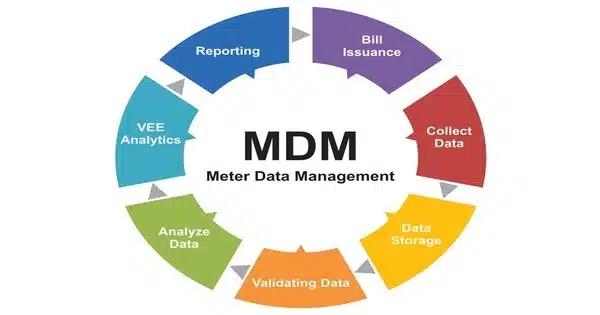Meter data management (MDM) refers to software that performs long-term data storage and management for the vast quantities of data delivered by smart metering systems. It refers to a system or software solution for collecting, storing, and managing data from utility meters. This data consists primarily of usage data and events that are imported from the head-end servers managing the data collection in advanced metering infrastructure (AMI) or automatic meter reading (AMR) systems.
MDM is a component in the smart grid infrastructure promoted by utility companies. This may also incorporate meter data analytics, the analysis of data emitted by electric smart meters that record consumption of electric energy. It is primarily used by electric, gas, and water utilities to effectively handle the massive amounts of data generated by smart meters.
The main functions of a Meter Data Management system include:
(a) Data Collection: MDM systems receive data from smart meters installed at customer premises. These meters record consumption information at regular intervals, typically every 15 minutes or hourly, and transmit it to the MDM system through various communication channels such as wired or wireless networks.
(b) Data Validation and Estimation: The MDM system validates the received data for accuracy and consistency, identifying any anomalies or errors. It also performs estimation techniques to fill in missing or erroneous data, ensuring a complete and reliable data set.
(c) Data Storage: The validated and estimated data is stored in a secure and structured manner within the MDM system’s database. The system maintains a historical repository of meter data, allowing for analysis, reporting, and billing purposes.
(d) Data Analytics: MDM systems often include analytical capabilities to process and interpret meter data. These analytics can generate insights on energy consumption patterns, demand forecasting, load profiling, and other key performance indicators. This information can help utilities optimize their operations, identify potential issues, and implement energy efficiency programs.
(e) Billing and Settlement: MDM systems integrate with billing systems to provide accurate consumption information for customer billing purposes. They enable the generation of detailed and precise invoices based on actual meter readings or calculated estimates.
(f) Data Exchange: MDM systems support data exchange with other utility systems, such as customer information systems (CIS), outage management systems (OMS), and distribution management systems (DMS). This integration enables seamless coordination and data sharing across various utility functions.
The implementation of MDM systems has become crucial with the widespread deployment of smart meters, as they generate large volumes of data that need to be efficiently managed and utilized. These systems provide utilities with the necessary infrastructure to process, validate, and leverage meter data effectively, enabling better decision-making, improved customer service, and enhanced operational efficiency.















